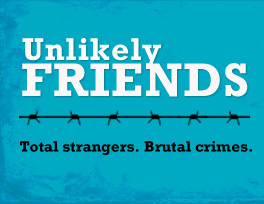Unlikely Friends: When Victims and Perpetrators Meet
A few years back, after I spent an evening at a halfway house for men on parole, Sister Mary Sean Hodges challenged me. She has worked tirelessly through the Office of Restorative Justice, LA Archdiocese, on behalf of incarcerated men and women and those seeking to reenter society. She liked what I’d done advocating for gang members, prisoners, and criminal justice reform, but in her view I had fallen short. “You have to meet the victims, too,” she said.
I did, and soon felt overwhelmed and helpless in the face of so much pain and rage. I wished there could be another way–a better way–to cope with such grief, but when I heard of other ways, I was cynical. I loved Reginald Denny for forgiving the teens who beat him unconscious during LA’s civil unrest, but, hey, with his head injury, he remembered nothing of the attack and I figured that made it easier to forgive. As for other cases I heard about, seriously, would you open your heart to your child’s murderer? I wanted to admire such compassion but it seemed more like delusional naïveté. You’d have to be a saint–or crazy.
So it was with a sense of relief, hope, and gratitude that I watched a sneak preview of Leslie Neale’s new documentary, Unlikely Friends, about victims who reached out to the perpetrators whose brutal crimes had caused so much hurt and pain. Perhaps the most remarkable thing about the remarkable relationships she documents is that they actually make sense.



